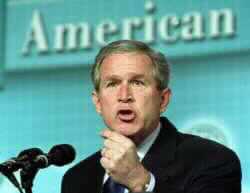With other nations' opposition hardening, the Bush administration left open the possibility Tuesday that it would not seek a United Nations vote on its war-making resolution if the measure was clearly headed for defeat. U.S. troop strength in the Gulf neared 300,000, and President Bush and his advisers were looking beyond the diplomatic showdown in the U.N. to make plans for public relations buildup to potential war with Iraq.
One option under serious consideration was Bush giving Iraqi leader Saddam Hussein a final ultimatum, perhaps with a short-term deadline, in an address next week, two senior White House officials said.
The officials, who spoke on condition of anonymity, stressed that a variety of options are on the table and all depend on the outcome of a U.N. Security Council debate on the U.S.-backed war resolution. In a new blow, Russia's top diplomat said Moscow might use its veto against the measure.
Even without a veto from Russia, China or France, the United States still doesn't have the nine votes needed to win approval of the resolution, according to both supporters and opponents. Many undecided council members are looking for a compromise.
A Bush Ultimatum Being Considered
Secretary of State Colin Powell, in an interview with RTL television of Germany, said that early next week U.S. leaders would "make a judgment on whether it's time to put the resolution up to a vote." But he also said the United States was inclined to push for a vote "in the absence of compliance on the part of Saddam Hussein."
At the White House, spokesman Ari Fleischer said, "The vote is desirable. It is not necessary."
Once the vote is resolved one way or another, Bush will intensify his case for war, officials said, barring unforeseen events such as Saddam suddenly disarming or going into exile.
In addition to a possible address, they have discussed a presidential news conference and a Cabinet meeting as ways for Bush to communicate his plans to the nation next week. He may stop short of a specific ultimatum, officials said, but would make it clear that war is imminent in other ways, such as warning journalists and humanitarian workers to get out of Iraq.
Meanwhile, Bush telephoned leaders of India and Egypt to discuss his plans. And officials said Powell had had two telephone conversations and a one-on-one meeting in recent days with Mexican Foreign Minister Luis Ernesto Derbez in his search for Mexican support.
Military Build up Continues
The Army's oldest armored division, "Old Ironsides," got its orders to head for the Persian Gulf, and Pentagon officials said
U.S. land, sea and air forces were approaching 300,000 in the region.
Tommy R. Franks, the commander who would lead the war, met at the Pentagon with Defense Secretary Donald H. Rumsfeld and was to consult with Bush on Wednesday.
Still to be resolved was the military question of whether Turkey would allow its territory to be used for U.S. ground forces to open a northern front against Iraq.
At the White House, Fleischer said Turkey would lose a proposed DLRS 15 billion aid package unless it went along.
Until Tuesday, the spokesman had suggested part of the package would be available to Turkey regardless of whether 62,000 American troops are allowed in the country. White House officials said they were turning up pressure on Turkey in hopes that the parliament would grant the U.S. request on a second vote.
Annan Sees Destruction of Iraqi al-Samoud Missiles as Positive Development
At the United Nations, meanwhile, Secretary-General Kofi Annan called Baghdad's destruction of missiles "a positive development," putting him at odds with Bush's assessment.
Russia's Foreign Minister Igor Ivanov, renewing Moscow's opposition to quick military action, indicated Russia might use its veto against the U.S.-backed U.N. resolution.
Other Key Developments Concerning Iraq
*_ Iraq destroyed three more Al Samoud 2 missiles.
*_ Kurdish soldiers in northern Iraq fatally shot five members of an allied group whom they mistook for terrorists, the Kurdish autonomous government said.
*_ An ABC News-Washington Post poll said nearly six in 10 people support Bush's plan to disarm Iraq. But 24 percent of those who support the policy say they still have serious reservations about a war. The poll of 1,022 adults had an error margin of plus or minus 3 percentage points.
*_ Turkey's top politician suggested that the government may again ask parliament to allow 62,000 American troops in Turkey in an attempt to reverse a weekend vote against the U.S. plan. White House spokesman Ari Fleischer said Turkey would lose a DLRS. 15 billion aid package unless it admits the U.S. troops.
*_ In a letter marking the Islamic new year, Saddam said Iraq will defeat any invaders and accused the United States of trying to turn Arabs into slaves.
PHOTO CAPTION
President Bush makes remarks during his speech to the American Medical Association's National Conference Tuesday, March 4, 2003, in Washington. (AP Photo/Ri
- Author:
& News Agencies - Section:
WORLD HEADLINES


 Home
Home Discover Islam
Discover Islam Quran Recitations
Quran Recitations Lectures
Lectures
 Fatwa
Fatwa Articles
Articles Fiqh
Fiqh E-Books
E-Books Boys & Girls
Boys & Girls  Hajj Rulings
Hajj Rulings Hajj Fatwas
Hajj Fatwas














